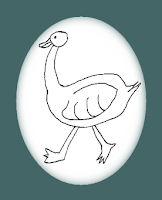Ever see a formation of geese in flight? Such a v formation is a beautiful sight to behold. View flights on YouTube.
An Everyday Mysteries webpage explains why geese fly in formation—energy conservation and visual group member tracking. View "Why Do Geese Fly in a 'V' Formation? - Don't Be Dumb" for a video explanation.
Merriam-Webster shows various noun definitions, with two different plural forms, and use as transitive verb.
plural geese \'ges\Well, the definition sent me scurrying to looking up other terms pertaining to fowl—feathered lores and reticulate tarsi.
- a : any of numerous large waterfowl (family Anatidae) that are intermediate between the swans and ducks and have long necks, feathered lores, and reticulate tarsi
b : a female goose as distinguished from a gander- : SIMPLETON, DOLT
- plural gooses : a tailor's smoothing iron with a gooseneck handle
- plural gooses : a poke between the buttocks
- From Birdspix (about white-winged parakeet)—
feathered lores (the part of the face between the eye and the beak)
- From Glossary of Avian External Anatomy—
Tarsi: plural of tarsus
Tarsus: lowest segment of leg, before toes
Reticulate: with small netlike scales (tarsus)
"a waterbird with webbed feet that is related to the smaller duck and the larger swan"
Goose-featured Expressions
Merriam-Webster's page for "goose" shows a wealth of expressions
- cook someone's goose
- the golden goose
- the goose that lays the golden egg
- what's good for the goose is good for the gander
- what's sauce for the goose is sauce for the gander
- wild goose chase
Remember Jack and the Beanstalk? Remember if the fowl that lays golden eggs? The answer to whether the fowl that lays golden eggs is a goose or hen is in a Yahoo q/a. The best answer also includes information about "killing the goose that lays the golden eggs".
Additional sources of expressions with "goose", apparently widely used are as follows:
loosey goosey
very loose or relaxedgoose step/goosestep/goose-step
1 a marching step of some infantries in which the legs are swung high and kept straight and stiff.Related: A Wikihow websote includes instructions and images to properly goosestep, along with cautions when exercising. Interesting statement: "In the United States, Goosestepping is often associated with Nazism, which may offend some people. This association is usually not made in other countries".
2 a military exercise in which the body is balanced on one foot, without advancing, while the other foot is swung forward and back.
I visualize "loosey goosey" and "goosestep" as contrasts in restful relaxation vs. rigidly rhythmic motion.
Goosebumps are skin features, but, additionally, a 2015 movie based on a series of books. Per Scientific American:
tiny elevations of the skin that resemble the skin of poultry after the feathers have been plucked. … caused by a contraction of miniature muscles that are attached to each hairGooseneck definitions depend on context and possible accompanying terms, as in the following examples:
- gooseneck: "a flexible metal pipe"
- gooseneck lamp: "an electric table lamp or desk lamp with a flexible shaft that permits control of the direction of the light"
- gooseneck trailer: "a truck trailer whose forward part is arched like a goose's neck and swiveled to the motor unit". View a short video about hitching a pickup truck to a gooseneck trailer.
Flock (General)
Skein (Flight)
Gaggle, Herd, Corps (Ground)
Weird Plurals—wonder why the plural of moose is not meese?
goose geese
moose moose
Visit Meme Center's Goose memes for goose phrases, accompanied by images and videos.
Mother Goose, Father Goose, and Granny Goose
Run across these named geese? Actually, Mother Goose is better known for many familiar children's rhymes, such as "Jack and Jill", "Baa, Baa, Black Sheep", and "Sing a Song of Sixpence". Father Goose was a 1964 Cary Grant movie. As for Granny Goose, the fame was in potato chips; the TV commercial lives on in YouTube.


No comments:
Post a Comment